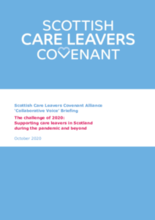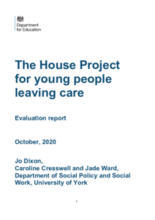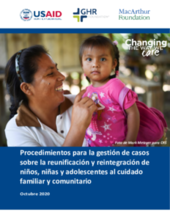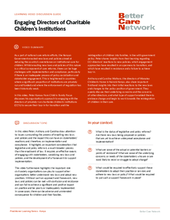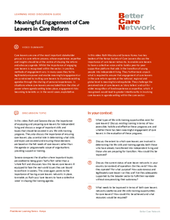Displaying 201 - 210 of 949
This systematic review synthesizes information about the relationships aging out foster youth have with their birth or stepparents after legally mandated separations in foster care.
This systematic review synthesizes information about the relationships aging out foster youth have with their birth or stepparents after legally mandated separations in foster care.
The aims of the study were to (a) describe families who had participated in the Home Parenting Education and Support (HoPES) programme, (b) describe the key education content and support activities of the programme, and (c) identify the enablers and challenges in implementing HoPES.
This briefing paper aims to highlight some of the key issues and some of the solutions that have been identified through regular meetings of the Scottish Care Leavers Covenant (SCLC) Alliance during the COVID-19 pandemic, drawing together learning from their own work and extensive networks with partners to offer a number of recommendations, and to prioritise steps to improve the lives of care leavers.
This report presents findings from an evaluation of the House Project (HP) in the U.K., which aims to improve outcomes for young people (in accommodation, education, employment and training (EET), wellbeing, autonomy and integration) and service level outcomes for young people leaving care aged 16 and over.
Los Procedimientos de Manejo de Casos para la Reunificación y Reintegración de los Niños, Niñas y Adolescentes al cuidado Familiar y Comunitaria se desarrollaron a través de talleres participativos en conjunto con la Secretaría de Bienestar Social (SBS), la Procuraduría de la Niñez y la Adolescencia (PNA) de la Procuraduría General de la Nación (PGN), El Organismo Judicial (OJ), El Consejo Nacional de Adopciones (CNA), la Asociación de Hogares Cristianos de Guatemala (ASOCRIGUA) y Hogar Aldeas de Esperanza. Se basó en el trabajo de Changing the Way We Care de Kenia en la Guía para trabajadores sociales: Manejo de casos para la reintegración de niños y niñas en cuidado familiar o comunitaria, adaptada al contexto guatemalteco.
The purpose of the research is to generate learning and recommendations to develop public policies to support the transition of adolescents and youth from the alternative care system to autonomous life in Argentina, Bolivia, Brazil, Colombia, Mexico and Peru.
Comprised of videos and accompanying discussion guides, this video series features the learning from practitioners working across a range of care-related programs and practices in Kenya.
In this video, Peter Kamau from Child in Family Focus discusses his organisation’s approach to engaging with the directors of privately-run charitable children’s institutions (CCI’s) to secure their buy-in for transition and the reintegration of children into families, in line with government policy.
In this video, Ruth Wacuka and Samora Korea, two key leaders of the Kenya Society of Care Leavers, discuss the importance of care leaver networks, to enable care leavers to have a collective voice and to build a peer-to-peer supportive platform that aids in the transition of young people into independent living.

